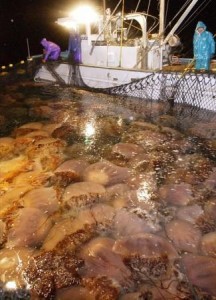Humans are part of the world’s ecosystem. Quite often Western society views the Earth as the place we have chosen to make our home, like an honour we have bestowed upon it. By our ‘ownership’ of the Earth we are able to subjugate it and pillage it to every extent. We distance ourselves from our huge population (over 7 billion at this point) and blind ourselves to the effects we, as a species, have on the environment. Perhaps it is the mystery of the ocean, or the murkiness of its depths, that stops us from regarding it in particular, but beyond our shores lies a vast quantity of wild, untamed AND fragile fish stocks that we are having an effect on.
It was shown over 15 years ago now, by Fisheries scientists at UBC, that we are ‘fishing down the food web’. A food web is an ecological tool that shows us the connections between organisms within a space. At the peak of these webs or cascades are the top predators: animals who eat animals who eat animals who eat animals (and so on). This discovery was a landmark in the understanding of fisheries science, but should also be a wake-up call to conscious (and conscientious) consumers of fish products. It states that we initially fish larger fish (higher predators) until the point of non-viability is reached, at which point we switch to a smaller sized fish lower down in the food chain and fish this to economic extinction. We ultimately end up at the point of no lower edible organisms- marine invertebrates. There is even a market for jellyfish now (Image Flickr User kantoku hk)!
One of the main causes of this effect is the way we view food. Instead of taking from the ocean in an equal measure, we take one species in very great quantity. Certain fish products become popular and we fish only them to extinction. Instead of eating all we catch, quality fish are thrown back because they do not meet the standards of our ideal fish. To meet the high demand we pursue the diminishing stocks with our advanced technology, taking wherever we can. This is what happened to the Tun: bluefin tuna were discarded in the 1930s for no-one liked their meaty taste. These fish are now amongst the most highly sought-after fish in the ocean. So great is their demand that there are (debated) claims of 90% depletion in unfished tuna stock.
So what can you do I hear you ask. Firstly, eat less fish. I know that is something a sushi-loving Vancouverite hates to hear, but our overfishing is a fact. 50% of the world’s fish stocks are fully exploited. That cannot last. Secondly, eat good fish. Eat sustainably caught, local fish, with a low environmental impact when you can. I’ll give you an example: Tuna is a top predator, so if it is removed from the system, it has multiplying effects on the species down the chain from it. Do not eat Tuna. Stop it. There are essentially no sustainable ways to eat it! Thirdly and most importantly, start showing you care. Petitioning our government to create a better fisheries management system is the best way to affect change. Front-running research in the field shows that primarily we need to create no-fish zones, low-fishing areas and ultimately stop the fish catch monoculture. If you’re interested in learning more about fisheries and our history of oceanic abuse, you could read ‘Four Fish’ by Paul Greenberg for some great insights.
Al Eggo

